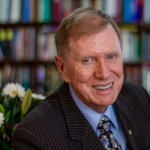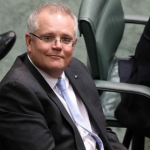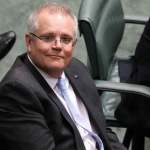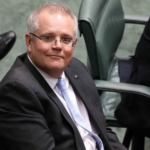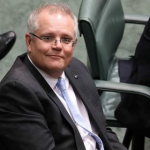Keeping Religion Out of Politics: An Interview With the National Secular Lobby’s Peter Monk
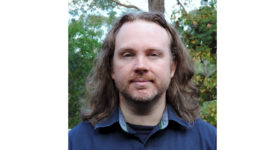
As the campaign for marriage equality grew stronger, the debate on religious freedoms rose to the fore, as the state agreeing to grant some in the community the same human rights as others, seemed to irk a number of people of faith, who felt their position was being threatened.
One of the most prominent advocates for broadening religious freedom laws is now prime minister. And last December, Scott Morrison announced that his government has plans to enact a Religious Discrimination Act.
While the debate around these freedoms seems on the surface to be about people having a right to follow whatever belief system they choose, underlying it is the broader right that some Australians would like to have to discriminate against others based on their lifestyles, especially sexuality.
One might have thought that the legal system wouldn’t have permitted laws that provide those of faith with the discretion to discriminate against others, but this idea was dispelled last October, when the nation realised it already has laws that allow for educational institutions to do just this.
Medieval murmurings
The Australian Christian Lobby heralded Morrison’s re-election as a win for religious freedoms. And while most voters were focusing on the economy and the environment, the election outcome means the majority that back a secular state might now be seeing this basic foundation challenged.
The Pentecostal PM believes that he won the election on a miracle. But, most of the constituency don’t want to leave the governing of the state up to divine providence. The majority want a clear line drawn between religious beliefs and the business of parliament.
Secularism has its roots in the thought of 19th century British reformer George Holyoake. He posited three components: separation of religion and state, freedom of conscience predicated on public order and individual rights and no discrimination by the state based on beliefs.
Section 116 of the Australian Constitution provides in quite a convoluted manner that Australia is a secular nation, though some like to debate this. And interestingly, it’s this same section of the country’s founding document that protects the “free exercise of any religion”.
Strengthening majority voice
On Monday, a National Secular Lobby (NSL) delegation met with ABC managing director David Anderson to secure stronger representation of the secular voice in the national broadcaster’s content, as it was argued it mainly gives precedence to the religious viewpoint.
Launched in January last year, the NSL has the aim of providing “a stronger and more active voice for the nation’s secular majority”. It has a number of high-profile ambassadors, including human rights lawyer Julian Burnside, broadcaster Phillip Adams and social commentator Jane Caro.
Sydney Criminal Lawyers spoke to NSL president Peter Monk about the implications of having a Pentecostal PM, the benefits that secularism has for religions and the problem with question 19 on the Census paper.
Firstly, when the current prime minister Scott Morrison gave his maiden speech in federal parliament in February 2008, he said, “Australia is not a secular country. It is a free country.” Peter, what do you think about this assertion?
I still don’t know what to entirely make of it. On the surface, it suggests that perhaps Scott Morrison doesn’t really understand what secularism is and what it does.
Obviously, it’s not a belief system, so it doesn’t tie you in to any particular limitations or moral courses of action, beyond the act that you can’t have policy unduly influenced by religion.
Secularism certainly doesn’t diminish freedom. It encourages freedom. It provides a level playing field for all beliefs and people with no beliefs.
If you have policy influenced by one particular belief system, whatever portion of the population that doesn’t agree with that system is then no longer free. They are to some degree restrained by other people’s beliefs.
If Australia chooses not to be secular in its politics, then it would make it less free, not more.
Morrison has just been re-elected to the top position. While he’s stated that he likes to keep his religious beliefs out of his politics, his actions have shown the opposite.
The PM is a member of the Sutherland Shire’s Horizon Church, which is similar to Hillsong. Both are Pentecostal. And although, Pentecostals only account for 1.1 percent of the population, they’re quite visible and hold a lot of sway.
In your opinion, what are the implications of having Morrison at the helm for another three years?
We’ll have a political environment in which religion will play a more present role. And probably, one in which the influence of religion over politics won’t be as easy to keep reasonable control over.
Scott Morrison is not entirely free to use his personal beliefs to dictate policy. But, he certainly occupies the most prominent and public position in the country. And he’s in the media on a daily basis.
So, he has plenty of opportunities to keep religion on the table and reinforce it as a relevant talking point.
If he mentions religion as a factor in some discussion, people assume it’s of relevant concern. And it can then be difficult for anyone to effectively rebut what’s being said from that level of public platform.
Morrison has a focus on religious freedom laws. He was spruiking these prior to becoming PM. And since taking the lead, he’s being talking about a Religious Discrimination Act.
What’s your take on the religious freedoms debate? And what would more of these types of laws mean?
It would really depend on the content of a Religious Discrimination Act, which is still to a large degree unknown. He does talk a lot about reducing discrimination, but I think he’s quite OK with some forms of it.
He’ll try to reduce any ability to discriminate against people because of their religion, which the NSL would certainly support.
But, at the same time, he will at least confirm and possibly strengthen the ability of religious organisations, such as schools, to discriminate against those whose lifestyle they don’t agree with. And the NSL certainly wouldn’t support that.
With all the talk of religious freedom that was brought out around the election, it’s important to remember that the Ruddock religious freedom review from last year really found no evidence that religious freedom is under threat in Australia.
The Liberal Party and religious organisations and lobby groups are continuously talking up this apparent threat to freedom, but really, it’s been found so far to be negligible.
In the government’s response to the Ruddock review, there’s definitely the suggestion that Morrison wants to go further than what was recommended, such as with the Religious Freedoms Commissioner, which was not part of Ruddock’s recommendations.
Besides what we’ve already touched on, where else do you see religion encroaching upon the political realm in this country?
There have been many areas in the news over the last 12 months where it has. And there are some issues that are being debated off and on in parliament now, which are being influenced by religion.
We’ve got areas of policy, such as assisted dying laws, abortion laws, the appearance of religious scripture in public schools, and even something like climate change is being influenced by religious views and beliefs.
At every level of parliament, every parliamentary sitting begins with a reading of a Christian prayer.
We’ve got many laws that make special provisions for religious organisations, in terms of being able to ignore discrimination laws or the receiving of tax benefits.
Church-owned businesses, even very large ones – most famously Sanitarium – pay no tax on their income, because they’re owned by the Church. And all together, this costs Australia about 20 billion a year.
One issue, that’s close to NSL’s heart, is the fact that advancing religion as a purpose for your
organisation is enough to qualify you as a charity, even if you don’t do any other charitable works.
For example, the Australian Christian Lobby is able to provide people with tax deductions on donations, whereas we’re not. And when you’ve got a political lobby group being effectively classed as a charity, the laws are pretty skewed in that sense.
Secularism is often branded as being anti-religious. How do you respond to such claims? And what are the implications of secularism for religions?
That’s a basic straw man argument. The conflation of secularism with atheism is often put forward deliberately in order to make secularism easier to attack.
In reality, many Australians who are religious are secular. There was an Ipsos poll from 2016 that suggested that 78 percent of Australians are pro-secular. And a figure of that size would have to include some religious people.
As I mentioned earlier, secularism encourages a fair degree of freedom. It effectively allows a voice for all religions and people of no religion. And it doesn’t persecute or favour any religion over others.
This is why some Christian groups aren’t really keen for it to grow in popularity, because in a more secular society, they will lose some of their power and influence.
There was a great quote on social media recently that said something like, when you’re accustomed to privilege, equality feels like oppression. That really captures how they’re feeling at the moment.
We aren’t trying to wipe out religion or limit people’s freedom of belief at all. We completely agree that should be a right people have.
But, it must logically follow that if we’re ensuring equality for all, then those that are currently in a position of privilege, will have to give up some of that privilege, so that everyone else can feel that they have their freedom.
They probably are feeling a bit threatened by secularism. But, to defend privilege under the banner of defending religious freedom is a bit hypocritical.
The NSL has stated that given the results of the 2016 Census, its agenda is timely. Why is that?
If you look at the Census figures going back 50 years, we’re seeing a continual rise in atheism. And we would expect that going into 2021, especially as we’re hopeful that the question on religion in the Census will finally be fixed.
Ever since question 19 was introduced, it’s been asking a closed question, which is what is the person’s religion, and it obviously assumes that they have one.
But, best practice in data collection says that you should be asking an open question, such as does the person have a religion, and then drilling down and working out what that religion might be.
Clearly, it makes no sense in the mind of an atheist to be governed by laws that are based on the religious beliefs of other people. And this would also be true, certainly, for people of religions other than Christianity.
All these other non-Christian religions are, like atheism, growing in the Census each time it is run.
I mentioned earlier the reading of the Christian prayer in parliament. For a member of parliament, who is a Muslim or a Buddhist or who is Jewish or atheist, to have to sit through that at the start of every day, is obviously not something that means anything to them.
And the fact that they have to sit through it is probably offensive to them.
As the Census is indicating, our society is always growing more pluralistic and more multicultural. And we would hope that along with that growth, we are also becoming more tolerant of these differences.
It’s definitely timely to boost secularism in politics.
The NSL was founded in July 2017. And it was officially launched in January last year. How does it go about promoting its agenda?
In terms of lobbying and media access, we’ve got a team of ambassadors, many of whom are well-known to the public. And they give their time to help promote our views and represent us, such as in our recent meeting with an ABC executive.
We’ve got a relationship – both formal and informal – with other pro-secular groups around Australia. And we’re working on getting this functioning as a secular network.
One of the big issues we’ve found is the Church is intrinsically a very organised hierarchy. And that is something of great value when it comes to, for instance, the communicating of views.
The secular side has never had that. It has always been small groups with different views on things. And they tend not to talk to each other very much. We’re hoping to get some organisation going on our side of the fence.
Traditionally, there has been so little put forward of the secular viewpoint in the media. And that’s something that we’re trying to change.
And lastly, Peter, the NSL points out that although section 116 of the Australian Constitution provides that the nation is secular, at present, it’s not fully secular.
How can full secularisation be brought about? And what specific issues are NSL’s priority at present?
The phrase in the Constitution is somewhat vague and incomplete in defining the limitations of religious influence. You can certainly see it. But, it’s hard to definitively say whether something goes against the Constitution or not.
We would certainly like to see the secular definition in the Constitution properly fleshed out, so we can be sure of where the lines are drawn. And that’s something that we are working towards.
As far as what we are going to be looking at, the Religious Discrimination Act will probably take up a fair bit of our time this year.
Because Scott Morrison has deliberately made religious freedom an election issue, he’ll be under a lot of pressure to deliver something in that area.
He’s taking on some of the points in the Ruddock review, and there have been several that have been referred to the law reform centre for advice.
We’re also expecting to see some change in the National School Chaplaincy Program, because there was a test case in Victoria in April, in which the chaplain position ads advertised in papers were found to be unlawful in terms of discrimination in requiring applicants to have a particular religion.
We’re expecting that to cause some change in the program around the country. We might even see a reintroduction of secular school chaplains, which the program previously had under the Gillard government, but was then lost when Tony Abbott got into power.
Spreading awareness and understanding of secular issues, and highlighting what their importance is to the public, is an ongoing job.
Religious freedoms have been dragged to the fore with the recent election, so it is really important, now more than ever, that people are aware of these issues. And how they affect their daily lives and the lives of people around them.


